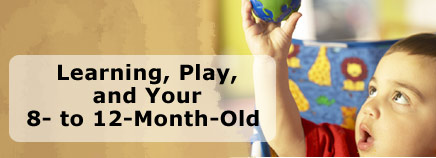
Your child has gone from tiny newborn to curious infant, reaching out and exploring his or her surroundings. That curiosity and readiness to learn will continue as your baby becomes more mobile during these next few months.
What Is My Child Learning?
Your little one will make great strides in learning. Play will take on a new dimension as language emerges. During these next few months, your baby’s babbling will start to morph into words like “mama,” “dada,” and “baba.” These will emerge randomly at first, but your baby will soon learn to associate them with mom, dad, and bottle.
Your baby will begin to use gestures like pointing and waving for expression. This is also the stage where your infant will understand more of what you are saying, including the word “no!”
As your child gets more mobile and interested in exploring, it’s important to provide supervision and to make sure to childproof the house to prevent accidents.
Babies this age are very busy learning how to move around. They learn to crawl during this stage, though some will develop more novel ways of getting around, such as creeping on their bellies, scooting on their bottoms, or rolling to where they want to go. It doesn’t matter so much how babies get around as long they’re able to move their arms and legs equally and coordinate both sides of the body.
Babies also become better at changing positions, moving readily from lying to sitting, then pulling themselves to stand. Holding on to furniture and other large objects nearby, your infant will take tentative first steps and start cruising along the furniture. Some babies may even learn to walk independently during this stage.
As hand-eye coordination improves, your baby will explore objects in greater detail, also learning their functions: you use a brush on your hair, you talk on the telephone.
Stranger anxiety and separation anxiety also can start now. Your baby may get upset when a stranger approaches or you try to leave, whether you’re going into the next room for a few seconds or leaving your child with a sitter for the evening. Your baby may cry, cling to you, and resist attention from others. This is normal and appropriate for this stage of development, and might intensify in the next few months, then slowly improve as your child develops the language and social skills to cope with a strange situation and feels secure that the separation isn’t permanent.
Encouraging Learning
Your baby’s ability to get around and never-ending curiosity boost learning now, so it’s important to provide chances — and a safe place — for exploration. Your baby may enjoy playing with egg cartons, blocks, balls, stacking toys, and push-pull toys. When your baby is in the bath, provide squeeze toys and cups and containers to splash around with.
Infants are learning to understand language so continue to talk to your baby. Introduce simple words by naming familiar objects and let your baby try to imitate you. Reinforce the words by repeating them. Encourage your infant’s expressions by waiting for a response when you are having a “conversation.”
Continue reading from books with large, colorful illustrations. Point to the pictures and say what’s in them to create associations between the things your child sees and the words that describe them.
Here are some other ideas for encouraging your 8- to 12-month-old to learn and play:
- Encourage crawling during tummy time by helping your baby get into the crawling position on hands and knees. Place a favorite toy out of reach and encourage your baby to move toward it.
- Continue to play games like peekaboo, but vary it a bit by hiding your face with a blanket and letting the baby pull it off, hiding around the corner, and showing your baby how to cover his or her own face with the hands.
- Continue to play hide and seek and test your child’s understanding of object permanence. Let your baby watch you hide a toy — first partially hidden, then covered completely — and let him or her find it.
- Teach your baby action songs, like “Pat-A-Cake,” “This Little Piggy,” “The Itsy Bitsy Spider,” and “Pop Goes the Weasel.” Babies love to hear and learn these songs and anticipate the accompanying movements.
There is a wide range of what is normal for babies, and some babies develop slower and faster than others. Talk with your child’s doctor if you have any concerns.

